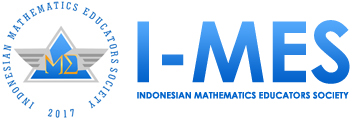Literasi Statistika Mahasiswa Adminitrasi Publik
DOI:
https://doi.org/10.35706/sjme.v4i2.3488Abstract
Kemampuan literasi statistika merupakan salah satu aspek penting
pembelajaran matematika yang perlu di kuasai oleh mahasiswa.
Beberapa hasil studi menggambarkan kemampuan literasi satistika
masih belum memuaskan. Alternatif yang dapat meningkatkan
kemampuan literasi statsitika adalah penggunaan pembelajaran
berbasis masalah. Tujuan dari penelitian untuk menganalisis
perbadaan kemampuan literasi statistika dan implikasi terhadap proses
pembelajaran. Penelitian ini menggunakan metode Pre-Eksperiment
dengan tipe One-shot Case Study. Populasi penelitian ini adalah
seluruh mahasiswa administrasi publik di Universitas Majalengka,
dengan sampel sebanyak 60 orang. Penelitian ini menghasilkan adanya
perbedaan signifikan kemampuan lietarasi statistika. Implikasi
terhadap proses pembelajaran berbasis masalah, penting untuk
mempersiapkan materi ajar yang berdasarkan kebutuhan siswa tidak
hanya sebatas bagaimana membuat aktivitas siswa mengkontruksi
pengetahuannya.
Downloads
References
Adiga, U., & Adiga, S. (2015). Problem based learning. International Journal of Current Research, 7(6), 17181–17187.
Albanese, M. A., Mitchell, S., & others. (1993). Problem-based learning: A review of literature on its outcomes and implementation issues. ACADEMIC MEDICINE-PHILADELPHIA-, 68, 52.
Arends, R. (2014). Learning to teach. McGraw-Hill Higher Education.
Arifin, M. (2014). Konsep-konsep Dasar Statistika. Diperoleh pada.
Ben-Zvi, D. & Garfield, J. (2004). Statistical literacy, reasoning, and thinking: Goals, definitions, and challenges. Dordrecht, The Netherlands: Kluwer.
Ben-Zvi, D., & Aridor-Berger, K. (2016). Children’s wonder how to wander between data and context. In The teaching and learning of statistics (pp. 25–36). Springer.
Ben-Zvi, D., & Makar, K. (2016). International perspectives on the teaching and learning of statistics. In The Teaching and Learning of Statistics (pp. 1–10). Springer.
Bodner, G. M. (1986). Constructivism: A theory of knowledge. Journal of Chemical Education, 63(10), 873.
Bowers, C. A. (2005). The false promises of constructivist theories of learning: A global and ecological critique (Vol. 14). Peter Lang.
Brousseau, G. (2006). Theory of didactical situations in mathematics: Didactique des mathématiques, 1970--1990 (Vol. 19). Springer Science & Business Media.
Campbell, D. T., & Stanley, J. C. (2015). Experimental and quasi-experimental designs for research. Ravenio Books.
Celik, P., Onder, F., & Silay, I. (2011). The effects of problem-based learning on the students’ success in physics course. Procedia-Social and Behavioral Sciences, 28, 656–660.
Damayantie, A. R. (2018). Literasi dari Era ke Era. Sasindo, 3(1).
Dasari, D. (2006). Kemampuan literasi statistis dan implikasinya Dalam pembelajaran. Seminar Nasional Matematika Dan Pendidikan Matematika, 1–9.
DelMas, R. C. (2002). Statistical literacy, reasoning, and learning: A commentary. Journal of Statistics Education, 10(3).
Duch, B., & others. (1996). Problems: A key factor in PBL. About Teaching, 50, 7–8.
Fardillah, F., Nurlaelah, E., & Sabandar, J. (2019). Keterkaitan Kemampuan Literasi dan Disposisi Statistis Mahasiswa Melalui Rigorous Mathematical Thinking. Simposium Nasional Mulitidisiplin (SinaMu).
Fraenkel, J. R., Wallen, N. E., & Hyun, H. H. (2011). How to design and evaluate research in education. New York: McGraw-Hill Humanities/Social Sciences/Languages.
Fransman, J. (2005). Understanding literacy: a concept paper. The EFA Global Monitoring Report, Literacy for Life, 31.
Gal, I. (2002). Adults’ statistical literacy: Meanings, components, responsibilities. International Statistical Review, 70(1), 1–25.
Garfield, J. (1995). How students learn statistics. International Statistical Review/Revue Internationale de Statistique, 25–34.
Garfield, J., & Chance, B. (2000). Assessment in statistics education: Issues and challenges. Mathematical Thinking and Learning, 2(1–2), 99–125.
Hafiyusholeh, M. (2015). Literasi Statistik dan Urgensinya Bagi Siswa. Wahana, 64(1), 1–8.
Hafiyusholeh, M., Budayasa, I. K., & Siswono, T. Y. E. (2017). Literasi Statistik: Siswa SMA dalam Membaca, Menafsirkan, dan Menyimpulkan Data. Prosiding SI MaNIs (Seminar Nasional Integrasi Matematika Dan Nilai-Nilai Islami), 1(1), 79–85.
Hevriansyah, P., & Megawanti, P. (2017). Pengaruh kemampuan awal terhadap hasil belajar matematika. JKPM (Jurnal Kajian Pendidikan Matematika), 2(1), 37–44.
Institute, O. of D. (2016). Building global interest in data literacy: a dialogue. In Educational Development Center. Retrieved from online: oceansofdata.org/ourwork/building-global-interest-data-literacy-dialogue-workshop-report
Kirschner, P. A., Sweller, J., & Clark, R. E. (2006). Why minimal guidance during instruction does not work: An analysis of the failure of constructivist, discovery, problem-based, experiential, and inquiry-based teaching. Educational Psychologist, 41(2), 75–86.
Lestari, W. (2017). Pengaruh Kemampuan Awal Matematika dan Motivasi Belajar Terhadap Hasil Belajar Matematika. Jurnal Analisa, 3(1), 76–84.
Mayer, R. E. (2004). Should there be a three-strikes rule against pure discovery learning? American Psychologist, 59(1), 14.
Miliyawati, B. (2012). Peningkatan Kemampuan Berpikir Kritis dan Self-Eficacy Matematis Siswa SMA dengan Menggunakan Pendekatan Investigasi. Universitas Pendidikan Indonesia.
Nikiforidou, Z., Lekka, A., & Pange, J. (2010). Statistical literacy at university level: the current trends. Procedia-Social and Behavioral Sciences, 9, 795–799.
Noviasari, E. (2017). Efektivitas penerapan pembelajaran berbasis masalah untuk melatih literasi statistik siswa SMP pada pada materi Statistika Kelas VII. UIN Sunan Ampel Surabaya.
Prince, M. (2004). Does active learning work? A review of the research. Journal of Engineering Education, 93(3), 223–231.
Reid, A., & Petocz, P. (2002). Students’ conceptions of statistics: A phenomenographic study. Journal of Statistics Education, 10(2).
Schield, M. (1999). Statistical literacy: Thinking critically about statistics. Of Significance, 1(1), 15–20.
Seltman, H. J. (2012). Experimental design and analysis. Online at: Http://Www. Stat. Cmu. Edu/, Hseltman/309/Book/Book. Pdf.
Sharma, S. (2017). Definitions and models of statistical literacy: a literature review. Open Review of Educational Research, 4(1), 118–133.
Songsore, E., & White, B. J. G. (2018). Students’ perceptions of the future relevance of statistics afer completing an online introductory statistics course. Statistics Education Research Journal, 17(2), 120–140.
Suryadi, D. (2015). Refleksi Kritis Tradisi Pendidikan Matematika dan Sebuah Gagasan Alternatif. In Pendidikan Disiplin Ilmu Abad 21: Sebuah Kajian Prospektif.
Taber, K. S. (2009). The Negative Heuristic and Criticisms of Constructivism in Science Education In Progressing Science Education: Constructing the Scientific Research Programme into the Contingent Nature of Learning Science (pp. 147-217). Dordrecht: Springer.
Takaria, J., & Talakua, M. (2018). The Ability Of Statistical Literacy Student Teacher Candidate In Terms Of Prior-Ability On Mathematics. Jurnal Kependidikan: Penelitian Inovasi Pembelajaran, 2(2), 395–408.
Tiro, M. A. (2018). Strategi Aksi Gerakan Nasional Literasi Statistika di Indonesia. Seminar Nasional Variansi (Venue Artikulasi-Riset, Inovasi, Resonansi-Teori, Dan Aplikasi Statistika), 2018, 1–21.
Tishkovskaya, S., & Lancaster, G. A. (2012). Statistical education in the 21st century: A review of challenges, teaching innovations and strategies for reform. Journal of Statistics Education, 20(2).
Wallman, K. K. (1993). Enhancing statistical literacy: Enriching our society. Journal of the American Statistical Association, 88(421), 1–8.
Yotongyos, M., Traiwichitkhun, D., & Kaemkate, W. (2015). Undergraduate Students’ Statistical Literacy: A Survey Study. Procedia-Social and Behavioral Sciences, 191, 2731–2734.
Downloads
Published
How to Cite
Issue
Section
License
Copyright (c) 2020 SJME (Supremum Journal of Mathematics Education)

This work is licensed under a Creative Commons Attribution-ShareAlike 4.0 International License.
Authors who publish with this journal agree to the following terms:
- Authors retain copyright and grant the journal right of first publication with the work simultaneously licensed under a Creative Commons Attribution License that allows others to share the work with an acknowledgment of the work's authorship and initial publication in this journal.
- Authors are able to enter into separate, additional contractual arrangements for the non-exclusive distribution of the journal's published version of the work (e.g., post it to an institutional repository or publish it in a book), with an acknowledgment of its initial publication in this journal.
- Authors are permitted and encouraged to post their work online (e.g., in institutional repositories or on their website) prior to and during the submission process, as it can lead to productive exchanges, as well as earlier and greater citation of published work (See The Effect of Open Access).











